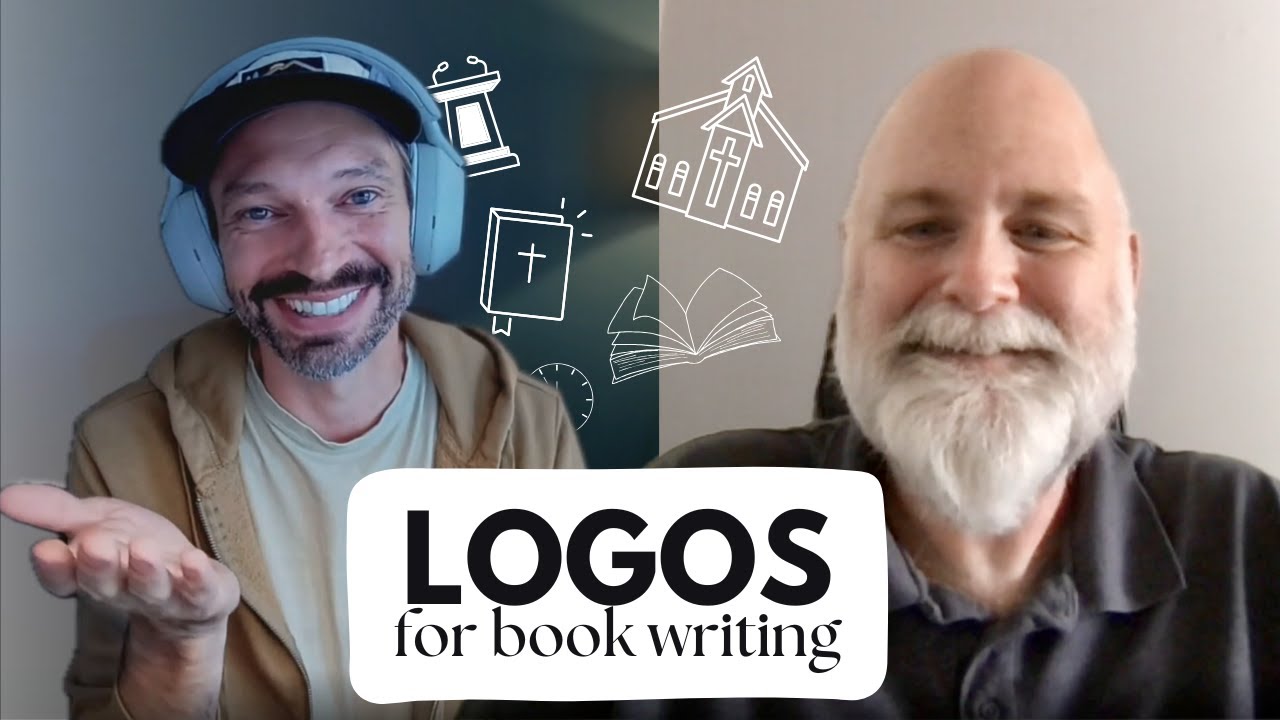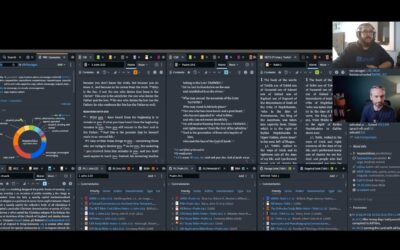Hey everyone, Jason Stone here, and I’m incredibly excited to share a truly mind-blowing conversation I recently had that completely redefined how I think about Logos Bible Software. For years, we’ve all known Logos as the gold standard for pastors, theologians, students, and academics – a powerful ally for sermon prep, deep exegesis, and scholarly research. But what if I told you it’s also a secret weapon for crafting paranormal supernatural suspense novels? Intrigued? You should be! I sat down with my friend, author Isaac Hunter, and he unveiled a workflow that is not only unconventional but brilliantly effective, leveraging Logos to build immersive, logically consistent, and deeply truthful fictional worlds.
The Unexpected Journey of a Fiction Writer
Isaac Hunter, based on the beautiful Oregon coast, isn’t your typical Logos user in the academic sense. While he does teach Sunday school and has a background in Christian philosophy from his doctorate program, his primary passion and endeavor is fiction writing. His novels delve into the paranormal and supernatural suspense, weaving in rich theological and philosophical themes, sometimes even sci-fi elements. What struck me immediately was Isaac’s profound conviction that his writing has become a ministry. He’s reaching people who might never step foot in a church – individuals captivated by witchcraft, Satanism, or the occult – but who would pick up a book about witches or fantastical elements. God has taken this personal journey, which began as a catharsis after a divorce, and molded it into something far greater than Isaac ever intended. His stories, all interconnected within a single, expansive world, ultimately show God winning out, often in “very weird ways”.
The Core Workflow: Logos and Scrivener – A Seamless Partnership
One of the most fascinating aspects of Isaac’s process is his unique digital workspace. He operates with a split-screen setup, dedicating one half to Logos Bible Software and the other to Scrivener. For those unfamiliar, Scrivener is a specialized word processor designed specifically for creative writing, allowing authors to “chunk everything up into small pieces”. This means Isaac can organize his writing into snippets, scenes, or chapters, moving them around as needed within Scrivener’s “binder”.
This seamless integration is key to his productivity. He can have Logos open on one side, with Scrivener on the other, bouncing back and forth with incredible speed. This prevents him from breaking his creative flow, a crucial element for a writer who admits to living in a “make-believe world” most of the time. He even turns off all notifications and puts on headphones to fully immerse himself in his narrative.
Logos Unleashed: AI Search, Exegetical Guide, and More
Isaac’s Logos layout is a testament to efficiency and deep research. His left-hand window features his primary Bible translations – the New King James Version (NKJV) for daily reading, alongside English versions of the Greek Bible (Septuagint and Majority Text) and direct Greek texts. This allows him to quickly access parallel translations and original language insights with just a click. He also keeps the Information Pane open, which automatically provides definitions and related details for any word he clicks on.
However, the real magic happens in his right-hand window, which functions as a dedicated “search window”. Here, he keeps two powerhouse tools: the Exegetical Guide and the Search feature, both heavily influenced by the inclusion of AI.
The Exegetical Guide acts as Isaac’s “assistant that I don’t have to pay”. When he’s on a particular Bible verse, it immediately searches all his Logos materials – including his own notes and sermon files – presenting information in a concise way. This is invaluable for grounding his stories in scriptural truth. The “word by word” feature within the Exegetical Guide is particularly useful, highlighting English equivalents of original Greek or Hebrew words, even for those without fluency in the languages. This ensures the “internal logic” and genuine nature of any ancient languages or concepts referenced in his books. For instance, in his book “Our Daughter,” which features Gnostic witches using Greek in their magic, Logos was instrumental in ensuring the historical and linguistic accuracy of these elements.
But it’s the AI-powered Search that has truly revolutionized Isaac’s research. Gone are the days of tedious “precise searches” like “grace within five words of Christ”. Now, Isaac simply asks Logos questions in natural language, such as “where in the Bible does it reference the book of Enoch?”. This allows him to directly query his vast 5,000+ book Logos library, which includes books he doesn’t even remember owning. He even uses it for obscure, non-theological research, like what kind of mushrooms grow in a certain place, finding references in unexpected books. This capability is critical for a writer who aims for realism, even in imaginary settings.
Isaac also highlights the “Cited By” feature, which shows him if other books in his library cite a particular verse, providing “really deep access really fast”. And because he tags all his bulk-purchased books (sometimes hundreds at a time) with an “all knowledge” tag, he can run comprehensive searches across his entire Logos universe.
The “Always Open Toolbox” and Grounding Fiction in Truth
One of Isaac’s core philosophies is that he keeps his entire Logos toolbox always open. He doesn’t bother with different layouts for different tasks. Whether he’s memorizing scripture for Awana, prepping a Sunday school lesson, or diving into research for his latest novel, his full suite of tools is ready at his fingertips. This mindset ensures maximum efficiency and prevents distractions, allowing him to stay immersed in his creative process.
This meticulous research is not just for authenticity; it’s about deeper theological and philosophical application. For example, in his current book, he’s exploring a character named Zach, a young man possessed by demons, which opens questions about the problem of evil and the limits of God’s grace. To tackle such sensitive topics, Isaac delves into deep demonology research using Logos’s AI, pulling up books he’d never have found otherwise, even if they aren’t explicitly categorized under “demonology”. He also uses Logos for practical, real-world details like police procedure, ensuring even these elements are realistic for his readers.
Isaac’s characters are often “broken people” dealing with “terrible positions and terrible circumstances”. He explores the universal truth of death, not as a natural part of life, but as a consequence of the curse, using Logos to deep dive into these profound themes. His goal is to ensure that while his storylines are imaginative, they are also “scripturally… logically makes sense” and uses “the whole council of God”.
This interview was truly unlike any I’ve had before, blowing my mind with the sheer ingenuity of Isaac’s approach. It’s a powerful reminder that tools like Logos are only limited by our imagination.
TLDR: Isaac Hunter’s Logos Workflow for Fiction
- Who: Isaac Hunter, a fiction writer of paranormal suspense novels.
- What: Uses Logos Bible Software for in-depth research to craft realistic and theologically grounded fictional worlds.
- How:
- Dual-Screen Setup: Logos on one side, Scrivener (a specialized writing processor) on the other for seamless workflow.
- AI-Powered Search: Asks natural language questions to his vast Logos library (5,000+ books) for both theological and obscure real-world details (e.g., demonology, police procedure, types of mushrooms).
- Exegetical Guide: Functions as an “unpaid assistant” for quick access to commentaries, linguistic insights, and cross-references, ensuring logical and scriptural consistency.
- “Always Open Toolbox”: Keeps his full Logos layout open to avoid breaking workflow and stay immersed in his creative process.
- Why it Matters: Logos enables him to bring deep theological and philosophical truths into secular fiction, impacting readers who might not engage with traditional ministry.
Watch the Full Interview Here!
I highly encourage you to watch the full interview to see Isaac’s amazing workflow in action. You can embed the video right here:
Relevant Resources Mentioned in the Interview:
Here are some of the key tools and resources Isaac mentioned that aid his unique writing and research process:
Isaac Hunter’s Website: You can learn more about Isaac and his captivating books at IsaacHunterTheWriter.com.
Logos Bible Software: The central platform for all his research and Bible study.
Scrivener: A specialized word processor used for creative writing and organizing novel content into smaller, manageable chunks.
New King James Version (NKJV): Isaac’s preferred English Bible translation for his daily reading and study.
Septuagint: The Greek translation of the Old Testament, which Isaac heavily leans on for his research.
Majority Text: A textual tradition for the Greek New Testament, also a key resource for Isaac.
Lexham English Text (LET): An English version of the Greek Bible in his Logos setup.
Greek Orthodox English Text: Another English version of the Greek Bible mentioned.
Textus Receptus: A collection of Greek texts for the New Testament that Isaac utilizes.
Exegetical Guide: A powerful Logos tool that acts as his “assistant” for in-depth verse-by-verse research, bringing up all relevant materials.
ICC Commentary: A commentary series Isaac references.
Pulpit Commentary: Another commentary series in his Logos library.
UBS Handbooks (UBS Handbook Series): Praised by Isaac for its textual and translation insights.
Treasury of Scripture Knowledge (TSK): An exhaustive cross-reference system Isaac uses to ensure scriptural consistency.
Theological Dictionaries: Isaac frequently references these for in-depth background material essential for his writing.
Books by Michael Heiser: Specifically noted for their relevance in his demonology research.






Hi, this is a comment.
To get started with moderating, editing, and deleting comments, please visit the Comments screen in the dashboard.
Commenter avatars come from Gravatar.